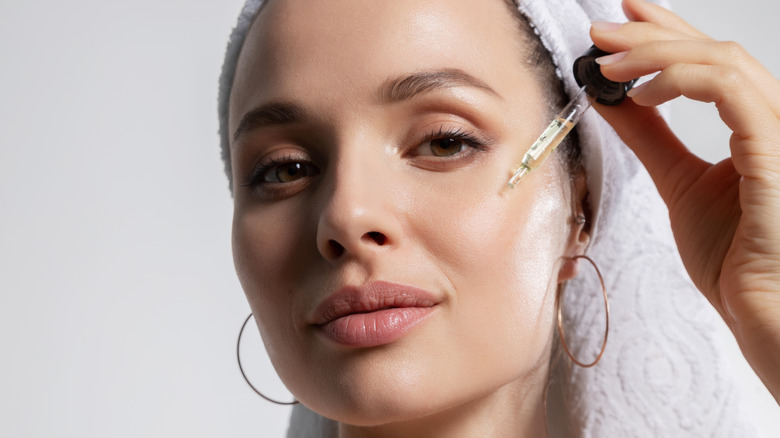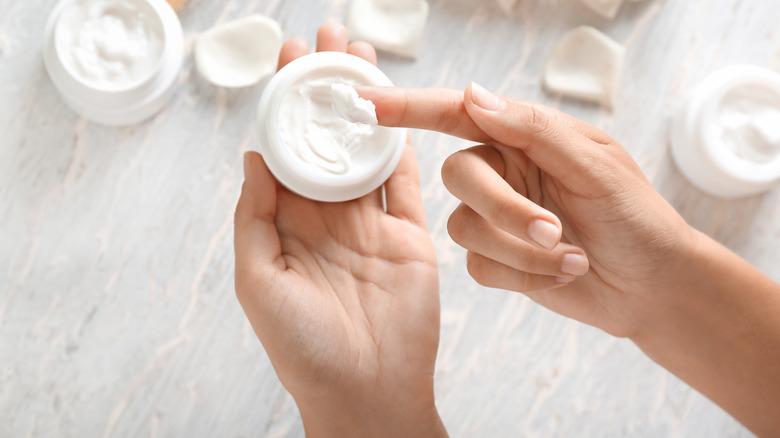Here's Everything You Need To Know Before Using Peptides In Your Skincare
Peptides are commonly used in anti-aging creams and other skincare products — and for good reason. These short chains of amino acids support collagen and elastin production, explains WebMD. Some peptides act as antioxidants, while others promote muscle and bone healing (via WebMD and BMC Medicine). Given these aspects, it's not surprising that manufacturers add peptides to a wide range of products, from eye serums to functional foods.
These compounds consist of two or more amino acids, notes Verywell Health. They occur naturally in the human body and play a variety of roles. Defensins, for example, fight microbes and support wound healing. The peptide hormone vasopressin regulates extracellular fluid volume and blood pressure, among other functions. Oxytocin, the so-called "love hormone," is associated with relationship-building and social bonding.
Synthetic peptides, such as those used in skincare products, may possess antioxidant, antimicrobial, anti-inflammatory, or anti-aging effects (via Verywell Health). Here's what you should know about these bioactive compounds and how they benefit your skin.
Peptides have the potential to slow down aging
The Linus Pauling Institute explains that peptides help your body synthesize collagen, elastin, and melanin while fighting bacteria. As a result, they protect the skin from UV radiation, which is a primary cause of photoaging. In clinical trials, these compounds have been shown to reduce the appearance of wrinkles and fine lines in as little as three months.
Collagen and elastin production decreases with age, explains Dr. Mary Sommerlad (via Vogue). The peptides in skincare products can help your body produce more of these proteins, leading to younger-looking skin. Dr. Sommerlad recommends using topical creams that contain signal and carrier peptides, as they can smooth out your skin and increase its firmness, among other benefits.
When you're shopping for skincare products, you won't see the terms "carrier peptides" or "signal peptides" listed on the label. Instead, you should check the ingredients list for copper, carnosine, tripeptides, or SA1-III (via Frontiers in Chemistry). Copper tripeptide-1 and manganese tripeptide-1, for example, are carrier peptides. Palmitoyl hexapeptide-12 and lipospondin, on the other hand, are signal peptides. Some creams also contain neurotransmitter peptides, but there isn't enough evidence to support their efficacy.
Peptides fight inflammation and keep your skin healthy
The skin barrier, or stratum corneum, protects against harmful bacteria, viruses, fungi, and toxic chemicals. According to a 2018 review published in the Indian Journal of Medical Research, antimicrobial peptides contribute to barrier function. These compounds keep your immune system strong while killing pathogens. At the same time, they balance the skin's microflora and facilitate wound healing (per Current Problems in Dermatology).
Other types of peptides may help reduce inflammation (via Food Science and Nutrition). Researchers found that peptide fractions derived from oysters may protect against oxidative damage and reduce inflammatory processes. Moreover, peptides can help repair damaged skin and decrease the appearance of dark spots (via the Linus Pauling Institute).
Despite these potential benefits, peptides won't magically give you perfect skin. First of all, peptide serums and creams vary in quality, depending on their composition. Second, the word "peptide" is often misused by manufacturers for marketing purposes, as Dr. Jennifer Herrmann points out in Byrdie. She also says that peptides have not been as extensively studied as other anti-aging ingredients. "I would also suggest understanding your skincare needs first, then looking for a formulation that combines peptides with ingredients known to be beneficial for your skin concern," Dr. Mary Sommerlad told Vogue. For example, it's recommended that you avoid peptide creams containing alpha-hydroxy acids (AHAs) or retinoids if you have sensitive skin. These ingredients have proven benefits, but they are not suitable for all skin types, so choose your skincare products wisely!


